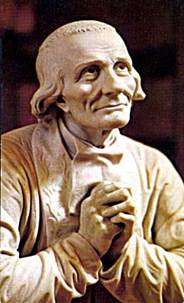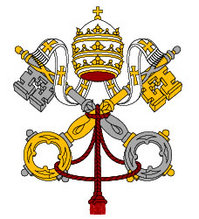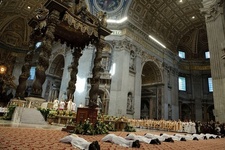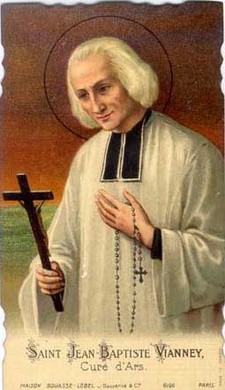
Year of Saint John Mary Vianney: May 2009 Archives


Today, James Cardinal Stafford, the Major Apostolic Penitentiary (or visit this link) announced that during the Year for Priests, June 19, 2009 - June 19, 2010, the Pope Benedict will grant plenary indulgences to priests and the faithful.
The year will begin on the Solemnity of the Sacred Heart of Jesus, "a day of priestly sanctification," when the Holy Father "will celebrate Vespers before relics" of Saint John Mary Vianney, patron saint of priests.
In recent years
we've been blessed with many favors granted through the pious work of Pope
Benedict. I, for one, am grateful to receive the Pope's solicitude for my
destiny, for my soul. Why am I happy? I am happy about this because I happen to
think the Pope is a man who enjoys a deep communion with the Lord and he is
guided by the Holy Spirit. His spiritual paternity is one that connects with my
desires to be a man prayer grounded in my desires for communion with God and
neighbor. I don't want to be controlled by sin; I don't want to be a sinner all
my life; I don't want to be ungrateful for the gifts I've received from the
Lord: life, parents and family, friends and colleagues, humor and intellect,
desire and faith, etc. Life is not easy. Christian living is even tougher some
days and I know what I am capable of and what I am not. Two favorite scripture
passages that focus my attention in daily living are: "O God, be merciful to me
a sinner" and "Lord, I believe, help my unbelief."
What is distressing about some of the criticism about indulgences is the ignorance of intelligent Catholics. There is a group of people who lack understanding of a sense of grace and mediation of the Church for our salvation are highly skeptical about the resurgence of talk on indulgences. You ask what is an indulgence and why are we speaking about indulgences again. In short, the point of an indulgence is that it "intends as its primary aim to stimulate the faithful in their fervor of charity, and thereby in the worthy reception of the Sacraments and the carrying out of the works of mercy and penance." More information can be gained by reading the article at this link.
The means to obtain the indulgence, this favor, are as follows:
(A) All truly penitent priests who, on any day, devotedly pray Lauds or Vespers before the Blessed Sacrament exposed to public adoration or in the tabernacle, and ... offer themselves with a ready and generous heart for the celebration of the Sacraments, especially the Sacrament of Penance, will be granted a Plenary Indulgence, which they can also apply to their deceased confreres, if in accordance with current norms they take Sacramental Confession and the Eucharist and pray in accordance with the intentions of the Supreme Pontiff. Priests are furthermore granted a Partial Indulgence, also applicable to deceased confreres, every time they devotedly recite the prayers duly approved to lead a saintly life and to carry out the duties entrusted to them.
(B) All truly penitent Christian faithful who, in church or oratory, devotedly attend Holy Mass and offer prayers to Jesus Christ, supreme and eternal Priest, for the priests of the Church, or perform any good work to sanctify and mold them to His Heart, are granted a Plenary Indulgence, on the condition that they have expiated their sins through Sacramental Confession and prayed in accordance with the intentions of the Supreme Pontiff. This may be done on the opening and closing days of the Year of Priests, on the 150th anniversary of the death of Saint John Mary Vianney, on the first Thursday of the month, or on any other day established by the ordinaries of particular places for the good of the faithful.
The elderly, the sick and all those who for any legitimate reason are unable to leave their homes, may still obtain a plenary indulgence if, with the soul completely removed from attachment to any form of sin and with the intention of observing, as soon as they can, the usual three conditions, "on the days concerned, they pray for the sanctification of priests and offer their sickness and suffering to God through Mary, Queen of the Apostles."
A partial indulgence will be offered to the faithful each time they pray five "Our Father," "Hail Mary," and "Glory Be," or any other duly approved prayer "in honor of the Sacred Heart of Jesus to ask that priests maintain purity and sanctity of life."

Bishop William Lori ordained two men to the diaconate today; they'll be ordained priests next year. Saturday, May 16, the Bishop ordains six men to the priesthood. These are happy days for the diocese of Bridgeport. So, I was thinking about the priesthood and what it means. While there are vast amounts of literature on nature of the priesthood, I thought Saint John Vianney would be an appropriate sounding board for today.
The priest is not a priest for himself; he does not give himself absolution; he does not administer the Sacraments to himself. He is not for himself, he is for you. After God, the priest is everything. Leave a parish twenty years without priests; they will worship beasts. If the missionary Father and I were to go away, you would say, "What can we do in this church? there is no Mass; Our Lord is not longer there: we may as well pray at home." When people wish to destroy religion, they begin by attacking the priest, because where there is no longer any priest there is no sacrifice, and where there is no longer any sacrifice there is no religion.
Saint John-Mary Vianney, The Little Catechism of the Cure of Ars
For some reason--and we can all make our own list as to
why--many Catholics have gotten away from the sacrament of Confession. I know my
own sense of grace and sin sends off an alarm when I receive Holy Communion
with mortal sin on my soul. My conscience gets the best of me as I think of
Saint Paul's warning that receiving the Eucharistic Lord with sin on the soul: to do so is at one's own peril. Avoiding Confession is imprudent, that is, not good at
all because one ignores reality, a life with sin squeezes out grace, one ignores the fact of Jesus' love for me
personally and mercifully and our humanity is reduced. Some theologians and commentators will say that the Eucharist
is forbidden Food if one receives the Eucharistic Lord with mortal sin on the
soul. Saint John-Mary Vianney had strong thoughts about the subject:

"How many have the temerity to approach the holy table
with sins hidden and disguised in confession. How many have not that sorrow
which the good God wants from them, and preserve a secret willingness to fall
back into sin, and do not put forth all their exertions to amend. How many do
not avoid the occasions of sin when they can, or preserve enmity in their
hearts even at the holy table. If you have ever been in these dispositions in
approaching Holy Communion, you have committed a sacrilege. It attacks the
Person of Jesus Christ Himself instead of scorning only His Commandments, like
other mortal sins." Vianney would also say that receiving Holy Eucharist
with sin on the soul "crucifies Jesus Christ in his heart."
Those of us who claim to have a conscience would not be pleased to hear from Saints Paul and John Vianney that by receiving Communion unworthily have worked out our condemnation. Saint John-Mary Vianney was not a saccharine man, was he?

